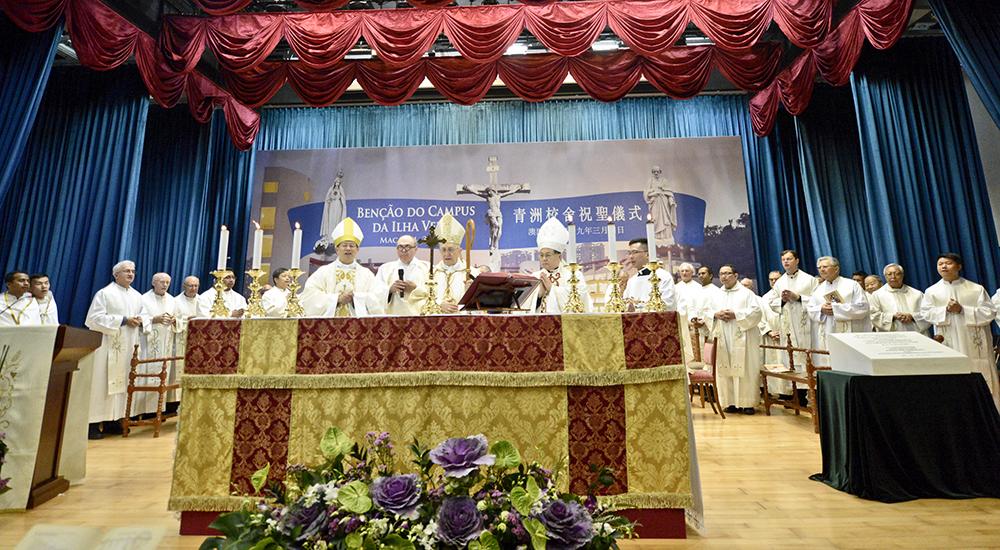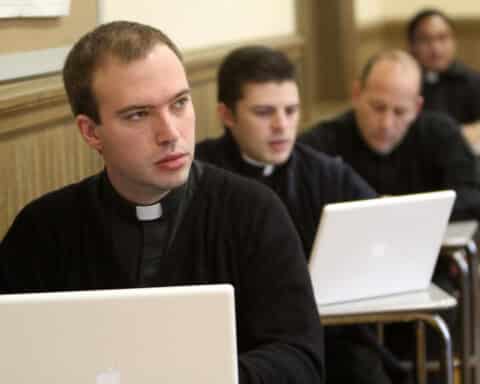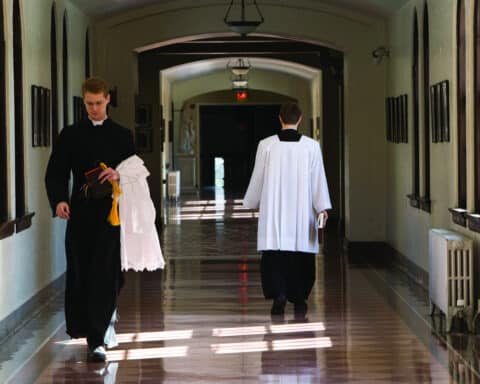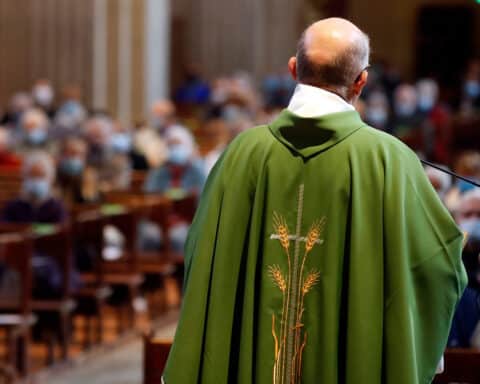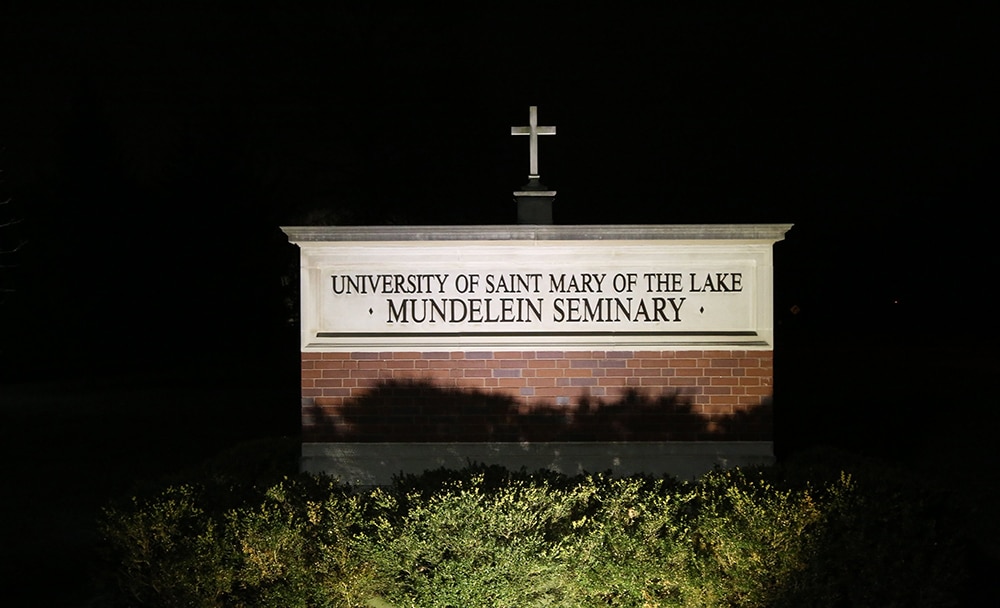In late July, the Vatican’s Congregation for the Evangelization of Peoples announced that it was establishing a new seminary in the Chinese territory of Macao under the administration of the Neocatechumenal Way, giving reason for the universal Church to pay attention to the evangelization efforts on Chinese soil again.
The Redemptoris Mater Seminary, which is scheduled to open in September, is “the fruit of apostolic creativity that looks to evangelization in that continent and expresses a will of decentralization of the Congregation of Propaganda Fide,” Cardinal Fernando Filoni, prefect of the Congregation for the Evangelization of Peoples, said in an interview with Vatican News Agency.
Macao is one of the Special Administrative Regions (SAR) granted by the Chinese government and, as such, enjoys a great deal of autonomy in terms of evangelization and delivering apostolic works. Macao has a long history of Catholic presence in both the formation of clergy and in building up the Church. The former Portuguese colony, which was returned to China 20 years ago, was a pivotal point for Jesuit missionaries such as Matteo Ricci, Francis Xavier and Alessandro Valignano, who all passed through it before going to China or Japan.
In continuation of this mission of education and evangelization, the Vatican has filled a necessary gap by approving a seminary that will form new priests who will serve not only Macao and China, but all of Asia.
In a 2007 letter addressed “to the bishops, priests, consecrated persons and lay faithful of the Catholic Church in the People’s Republic of China,” Pope Benedict XVI addressed the growing need for forming seminarians, writing: “I realize that in China, too, as in the rest of the Church, the need for an adequate ongoing formation of the clergy is emerging. Hence the invitation, addressed to you bishops as leaders of ecclesial communities, to think especially of the young clergy who are increasingly subject to new pastoral challenges, linked to the demands of the task of evangelizing a society as complex as present-day Chinese society.”
Theological education
In light of the needs of theological education and formation of clergy in Asia, the Diocese of Macao has taken a big step to renew the tradition of theological education locally, which enables seminarians, religious sisters and laypeople to study theology that is approved by the Macao SAR government and the universal Church. The Faculty of Religious Studies at the University of St. Joseph — the only Catholic university in Macao, as well as the only one in all of mainland China — has been working to educate students in its theology department for more than a decade. The university, which has laid the groundwork for theological studies in the region, will partner with the new Redemptoris Mater Seminary, according to Bishop D. Stephen Lee Bun-sang of Macao, who also serves as chancellor of the University of St. Joseph.
“The establishment of the Redemptoris Mater Seminary in Macao is a joint project between the Congregation for the Evangelization of the Peoples and the Neocatechumenal Way,” the bishop said. “It is an international regional seminary born out of their joint initiatives and the project has received permission from the bishop of Macao. This seminary is independent of the Diocese of Macao in its administration, finance and governance. However, the seminarians of the Redemptoris Mater Seminary will attend the faculty of religious studies of the University of St. Joseph for their philosophical and theological studies.”
Future life of the Church
It has been 50 years since formal classes in philosophy and theology have been held in the historically significant building of the diocese’s Seminário de São José. The reestablishment of theological studies has been a major objective of the Macau Inter-University Institute (the name was changed to the University of St. Joseph) since its establishment in 1996 as a partnership between the Catholic University of Portugal and the Diocese of Macao. The impact of this initiative and its potential for the future life of the Church in China, for acting as a bridge in Sino-Vatican dialogue and for revitalizing the missionary efforts in China are matters of hope to be pursued with prudent effort.
The Second Vatican Council’s Decree on the Mission Activity of the Church, Ad Gentes, reiterated the mission of the Church as “by its very nature missionary since, according to the Father, it has its origin in the mission of the Son and the Holy Spirit” (No. 2). The document goes on to say that special consideration is given to the role of universities and scientific institutes to prepare “the heralds of the Gospel, and preparing for the dialogue with non-Chistians” (No. 41). In a subsequent document, Ecclesiae Sanctae, on the norms for implementing, in part, Ad Gentes, Pope Paul VI writes that the Church’s mission to evangelize is “to be taken into account in arranging studies in seminaries and universities” (No. 1). Further, in Redemptoris Missio, Pope John Paul II reiterates, “No believer in Christ, no institution of the Church can avoid this supreme duty: to proclaim Christ to all peoples” (No. 3)
The possibility of providing theological and religious study has been discussed since 2006, when Church officials and education leaders, including Bishop José Lai Hung-seng of Macao (now bishop emeritus), received an official visit from Madam Liu Yandong, the leader of the United Front, a department of China’s government that gives a platform to non-Communist entities in the country. Then, as is the case now, there was a real need for a theology course with an English language medium to meet the needs of students not only from China, but also from the surrounding region, mainly for religious communities, but also for diocesan priests, seminary candidates and laypeople.
Challenges
Like all universities and colleges under the status of a Special Administrative Region, the University of St. Joseph has lodged student quotas to China’s central government for all its courses for approval. However, the responses are still in vain, and it hinders the development of the university as it strives to serve as a bridge for students between China and the rest of the world.
Despite the challenges on admitting students from the mainland, the University of St. Joseph offers a very constructive platform for educating seminarians from both the diocesan seminary — the Seminário de São José — as well as other congregational seminaries and missionary seminaries, such as the new Redemptoris Mater seminary, which is scheduled to open in September. The University of St. Joseph continues to support an atmosphere of mutual respect while enhancing the ongoing efforts at normalizing relations with the wider Catholic Church. Students thus will live and study in an environment of religious freedom. Professor Stephen Morgan, dean of the Faculty of Religious Studies, said the department “is both a place where religion can be encountered and studied and one in which all can come to engage with the Catholic faith, understood as a life-giving sacra doctrina, holy teaching. Being situated in Macao, the faculty continues the long tradition of dialogue between faith and culture.”
Cardinal Filoni said that the new college’s “specific nature is to take care of the formation for missionary priests who will have the evangelization in the territories of Asia at heart.”
On May 22, the feast of Our Lady, Help of Christians, Pope Francis took the opportunity to express his “special closeness and affection to all the Catholics in China, who, among daily labors and trials, continue to believe, to hope and to love. May our mamma of heaven help you all to be witnesses of charity and of fraternity, always remaining united in the communion of the universal Church.”
Benedict Keith Ip writes from Macao.
| Religion in Macao |
|---|
|
According to the website refworld.org, the 2016 estimated population of Macao is 597,000. The Special Administrative Region Government Information Bureau reports that nearly 80% of the population practices Buddhism. There are approximately 30,000 Roman Catholics. More than half are foreign domestic workers and other expatriates. There are about 8,000 Protestants.
The Basic Law offers residents freedom of religious beliefs and freedom to publicly preach and conduct religious activities. Source: refworld.org |

